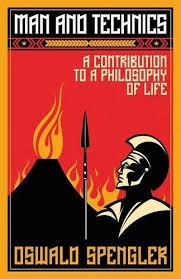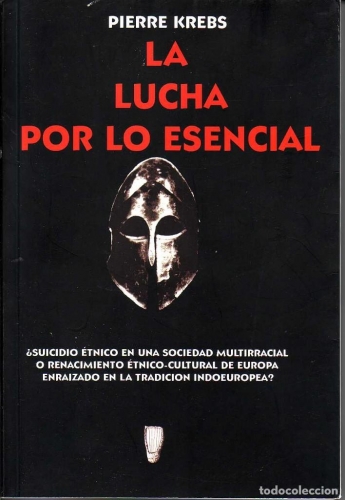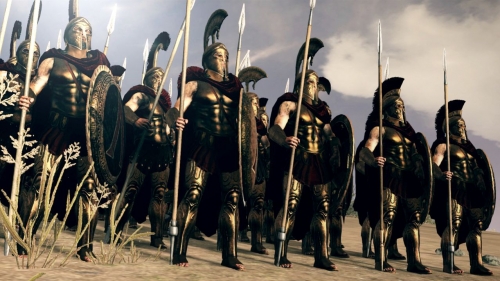The decline of Spengler: reconsidering High Cultures
Ex: http://westdest.blogspot.com
It has been decades since I last tackled Oswald Spengler, and it seemed time to refresh my understanding of his major work. Upon the advice of a Spengler expert (and following the Pareto Principle), I acquired the abridged edition of The Decline of the West.
 First, a few words about Spengler’s writing in this book, which I found to be terrible: like Heidegger, overly dense and sometimes nearly incomprehensible in the pompous old school German style (in contrast, Nietzsche, particularly apart from Zarathustra, was exceedingly comprehensible and easily understandable). Contrary to all of Spengler’s breathless fans, I did not find his magnum opus to be very well written. It’s a terribly boring, turgid compilation of rambling prose. I can only imagine the full-scale version is worse (and if memory serves, it was). Another point is that Spengler’s deconstructivism is highly annoying to the more empiricist among us, his idea that Nature is a function of a particular culture. Well (and the same applies to some of Yockey’s [plagiarized] rambling on the subject), for some cultures, Nature apparently is a more accurate “function” of reality than for others, and this more accurate representation of objective reality has real world consequences that cannot be evaded.
First, a few words about Spengler’s writing in this book, which I found to be terrible: like Heidegger, overly dense and sometimes nearly incomprehensible in the pompous old school German style (in contrast, Nietzsche, particularly apart from Zarathustra, was exceedingly comprehensible and easily understandable). Contrary to all of Spengler’s breathless fans, I did not find his magnum opus to be very well written. It’s a terribly boring, turgid compilation of rambling prose. I can only imagine the full-scale version is worse (and if memory serves, it was). Another point is that Spengler’s deconstructivism is highly annoying to the more empiricist among us, his idea that Nature is a function of a particular culture. Well (and the same applies to some of Yockey’s [plagiarized] rambling on the subject), for some cultures, Nature apparently is a more accurate “function” of reality than for others, and this more accurate representation of objective reality has real world consequences that cannot be evaded.
Thus, Spengler’s rambling on “Nature Knowledge” can be for the most part safely ignored. Spengler laughably wrote: “Every atomic theory, therefore, is a myth, and not an experience.” Yes, tell that to the Japanese of Hiroshima and Nagasaki, who encountered the myth – not the experience, oh no! – of being blasted by atom bombs. Spengler’s comments about the “uranium atom” are particularly ludicrous in hindsight. I have to say: Spengler was an idiot (*).
The problem with Spengler (and Yockey) and science is that the Spenglerian view could be tenable if science was only a purely abstract phenomenon, with no practical real world consequences. Unfortunately, for Spengler, science leads to technics, and the outcome of technics (contra Yockey) is directly related to the reality behind the science. In the absence of real world consequences, in the absence of technics, the Spenglerians can pretend that there is no objective difference between, say, Classical or Egyptian physics on the one hand, and Faustian physics on the other. However, the former, if followed to technics, will not lead to methods that can obliterate cities, shatter mountains, and sink islands; while the latter can, and has. Facts are facts. “Theory is working hypothesis…” according to Spengler’s formulation of Faustian technics, but that can be just as easily reversed: the working hypothesis is based upon theory. Without scientific theory, practical technics is mere makeshift tinkering.
 The sections “Race is Style” and “People and Nation” are of course relevant from a racial nationalist perspective, and reflects Spengler’s anti-scientific stupidity, this time about biological race. Those of you familiar with Yockey’s wrong-headed assertions on this topic will see all the same in Spengler’s work (from which Yockey lifted his assertions). This has been critiqued by many – from Revilo Oliver to myself – and it is not necessary to rehash all of the arguments against the Spenglerian (Boasian) deconstructivist attitudes toward biological race. We can just shake our heads sadly about Spengler’s racial fantasies – that is as absurd as that of any hysterical leftist SJW race-denier – and move on to other issues.
The sections “Race is Style” and “People and Nation” are of course relevant from a racial nationalist perspective, and reflects Spengler’s anti-scientific stupidity, this time about biological race. Those of you familiar with Yockey’s wrong-headed assertions on this topic will see all the same in Spengler’s work (from which Yockey lifted his assertions). This has been critiqued by many – from Revilo Oliver to myself – and it is not necessary to rehash all of the arguments against the Spenglerian (Boasian) deconstructivist attitudes toward biological race. We can just shake our heads sadly about Spengler’s racial fantasies – that is as absurd as that of any hysterical leftist SJW race-denier – and move on to other issues.
The comments by Spengler (and others) about the Russian soul and Russian character, and its “non-Faustian” nature (‘the horizontal expansive plain…the plain, the plain….”) are interesting, and may well have some validity (as a close look at Russian literature informs us, to some degree). But this can all be taken too far. With the benefit of hindsight obviously not available to Spengler himself – but which is just as obviously available to modern-day Spenglerians – we look at the Russian interest in space exploration, particularly during the Soviet period, and ask – was that merely just for political propaganda purposes? The answer is not quite clear. There are differences between cultures, yes, but when there is an underlying racial affinity, then the different cultures are not quite orthogonal to each other. And the same principle applies to the Classical-Faustian distinction as well. Spengler would argue that the Classical and Faustian are as different from each other than either are to, say, the Chinese, Indian, or Egyptian. I think that’s nonsense, and the same applies to Russian-Faustian/Western. There are differences and then there are DIFFERENCES. Being more objective about Spengler’s ideas than Spengler himself, I hope the “differences between differences” are obvious.
The section on “State and History” was actually readable and made some valid points, but I disagree with Spenglerian inevitability, and I believe he draws the line of the Fellah stage too early in some historical cases. The high point of the Roman Empire, the Pax Romana – was a historyless desert? Spengler, I think, became too enamored with his own theories (or nonsense, if you want to be harsh). The “Philosophy of Politics” section is also readable, with some useful points, but also has, obviously, areas of profound disagreement between Spengler and reality. The idea that the “born statesman” has – or should have - no convictions, should be a completely amoral actor dealing with facts and effects with no ideology affecting their actions - that I reject. Who is or is not a “born statesmen?” The examples Spengler gives are ludicrous given his assertion. Sulla, Robespierre, Bismarck, and Pitt – they all acted with no underlying ideology or conviction influencing their actions? I will say his comments about the value of a “tradition” in politics, statesmanship, in fact in any manifestation or organized human activity (comments mirrored by Yockey), are basically sound. Again, in reading Spengler, there are some diamonds in the piles of dirt and dung; one has to dig them out and treasure them. However, the diamond-to-dung ratio is not enough to grant Spengler the acclaim as a “great writer.” While Spengler and his ideas have worth, whether or not we agree with all of them, I wonder if he may not be one of the most over-rated writers in history.
 Those are mere details however. Important details, but not the fundamental, the main thesis. So, what about the main thesis of his work? The overall idea of cyclical history? Yockey’s lifting of that idea in his own work? Rereading Spengler’s major thesis hasn’t changed my mind about it in any major way, but there are some further points to make.
Those are mere details however. Important details, but not the fundamental, the main thesis. So, what about the main thesis of his work? The overall idea of cyclical history? Yockey’s lifting of that idea in his own work? Rereading Spengler’s major thesis hasn’t changed my mind about it in any major way, but there are some further points to make.
To begin with, I do believe that Spengler was on to something; his most fundamental observations about the cyclical nature of High Cultures, in their broadest sense, have validity. I reject his self-assured assertions about inevitability and his smug and snide pontification about the emptiness of current and future cultural possibilities, as well as his complete lack of self-awareness of the effects of his fundamental observation on the ability of future generations to interfere with what was previously a completely unguided historical process. By analogy, before the germ theory of infectious disease was asserted, and then proven as fact, man was for the most part helpless against the onslaught of microbes, apart from the natural and (by conscious thought) unguided processes of the human immune system. After the discovery of the germ-disease link, we have preventive and therapeutic interventions against these diseases. Furthering this analogy, we can say that before Spengler, man was helpless in the face of historical inevitability; after Spengler and his discovery, the situation is changed.
Another point: being more familiar with Yockey’s work than with Spengler’s, I note how much Yockey plagiarized from Spengler. Everyone talks about Yockey plagiarizing Carl Schmitt, and that Spengler “inspired” Yockey - well, if by “inspired” you mean ruthlessly copy than, yes, Yockey was very “inspired.” However, I do not say that to disparage Yockey or Imperium, the work which contains most of the plagiarism in question. Yockey was a political polemicist, and Imperium was meant to be a thoroughly political work, sort of a Communist Manifesto for fascists, it wasn’t meant as a scholarly work and Yockey made no pretense of any original thought in that book. So, I just note for the record that the plagiarism took place. I also note that, in a real sense, it is good that the plagiarism did take place, because Imperium is much more readable, much more digestible, than Spengler’s ponderous work, which is, as stated above, a caricature of “heavy” self-indulgent pedantic German scholarship. Spengler’s views on (biological) race, as derived from his statements in this book, were as wrong-headed as Yockey’s regurgitation of them. But enough of that; it is a side-issue at this time, and has been already discussed, by myself and (many) others, with respect to Imperium.
 Let’s get back to Spengler’s content, and some of my objections alluded to above. Thus, as far as content goes, my “take” on it remains the same; I agree with much but I disagree with much as well, particularly the “pessimistic” inevitability of it, and the smug arrogance in suggesting, or implying, that disagreement with that aspect of the work implies some sort of mental weakness, delusion, or cowardice on the part of the reader. Spengler himself suggests that he “truth” of the book is a “truth” for him, a “truth” for a particular Culture in a particular time, and should not necessarily be viewed as an absolute truth in any or every sense (indeed, it everything from science to mathematics is, according to Spengler, formed by the Culture which creates it, and is thus no absolute in any universal sense, then we can quote Pilate ‘“what is truth?”). Therefore, my “truth” in the current year leads me to conclusions different from Spengler; one can again assert that Spengler himself, by writing the book and outlining he problem, himself undermined his assertion of inevitability, since know we can understand the trajectories of Cultures and, possibly, how to affect those trajectories.
Let’s get back to Spengler’s content, and some of my objections alluded to above. Thus, as far as content goes, my “take” on it remains the same; I agree with much but I disagree with much as well, particularly the “pessimistic” inevitability of it, and the smug arrogance in suggesting, or implying, that disagreement with that aspect of the work implies some sort of mental weakness, delusion, or cowardice on the part of the reader. Spengler himself suggests that he “truth” of the book is a “truth” for him, a “truth” for a particular Culture in a particular time, and should not necessarily be viewed as an absolute truth in any or every sense (indeed, it everything from science to mathematics is, according to Spengler, formed by the Culture which creates it, and is thus no absolute in any universal sense, then we can quote Pilate ‘“what is truth?”). Therefore, my “truth” in the current year leads me to conclusions different from Spengler; one can again assert that Spengler himself, by writing the book and outlining he problem, himself undermined his assertion of inevitability, since know we can understand the trajectories of Cultures and, possibly, how to affect those trajectories.
I’ll have more to say about that shortly.
One thing about re-reading the book that did influence me – more of a minor point – is that I’m now more in agreement (although not totally in agreement) with Spengler that the Classical Culture was quite different from out Western Faustian one. There was always a sense of a different style, a different mindset, a different worldview, but The Decline of the West, and the evidence Spengler presents, helps clarify the Classical-Faustian distinction and brings it into stark relief. So, yes, there’s more to that issue than I previously thought. However, it doesn’t’ change the fact that both the Classical and the Faustian (or Western) High Cultures came into being in Europe, created by Europeans, and, therefore, if we accept one aspect of Spenglerian inevitability – the actual “decline of the West” – and indeed we appear to be ahead of schedule, well into Winter, then we can discard other aspects of inevitability and assert that Europe and Europeans are well capable of creating other High Cultures.
So, I will say that Spengler exaggerates the Classical-Faustian divide, even though I’m a bit more supportive of his views on that than before. There is an intermediate ground between saying the two Cultures are completely and utterly distinct entities with absolutely no connection and saying that the Faustian is merely an outgrowth of the Classical. On a side note, as a result of re-reading Spengler, I’m now studying the last period of the Western Roman Empire, from Adrianople to Odoacer, to (1) examine the parallels to our own day, (2) discern the “breaking point” where the last vestiges of the Classical World died out (What happened? How? What came after, what was the result?), and (3) to re-examine stupid “movement” dogma on how the later Empire was becoming ever more decadent as a result of racial changes (if anything, the later Empire was more moral than before).
 That is related to an important deficit in the work of Spengler that I have read. He describes the lifecycle of High Cultures, but never really dissects why the cultures inevitably (or so he says) move from Culture to Civilization to Fellahdom. What actually are the mechanistic causes of Spring to Summer to Fall to Winter? I guess that Spengler (and Yockey) would just say that it is what it is, that the Culture is life an organism that grows old and dies. The problem is that this analogy is just that, an analogy. A Culture is composed of living organisms, humans, but is itself not alive. And esoteric rambling about a “cosmic beat” explains nothing. If ones buys into the Spenglerian premise, then some rigorous analysis as to why High Cultures progress in particular ways is necessary. We need an anatomical and molecular analysis of the “living organism” of the High Culture. Does Frost’s genetic pacification play a role? The cycle, noted by Hamilton, of barbarian invasions, the influx of altruism genes, followed by the aging of the civilization at which point fresh barbarian genes are required to spark a renaissance in the depleted fellhahs? The moral decay that occurs with too much luxury, too much wealth, too much power? A form of memetic exhaustion?
That is related to an important deficit in the work of Spengler that I have read. He describes the lifecycle of High Cultures, but never really dissects why the cultures inevitably (or so he says) move from Culture to Civilization to Fellahdom. What actually are the mechanistic causes of Spring to Summer to Fall to Winter? I guess that Spengler (and Yockey) would just say that it is what it is, that the Culture is life an organism that grows old and dies. The problem is that this analogy is just that, an analogy. A Culture is composed of living organisms, humans, but is itself not alive. And esoteric rambling about a “cosmic beat” explains nothing. If ones buys into the Spenglerian premise, then some rigorous analysis as to why High Cultures progress in particular ways is necessary. We need an anatomical and molecular analysis of the “living organism” of the High Culture. Does Frost’s genetic pacification play a role? The cycle, noted by Hamilton, of barbarian invasions, the influx of altruism genes, followed by the aging of the civilization at which point fresh barbarian genes are required to spark a renaissance in the depleted fellhahs? The moral decay that occurs with too much luxury, too much wealth, too much power? A form of memetic exhaustion?
By analogy to the memetic exhaustion hypothesis, consider successful television shows. Although a few of these have been unusually very long lasting – but even these eventually do go off the air – the vast majority follow a trajectory of a lifespan of, say, half-a-dozen years or so. In the first season of a successful show, there is freshness and novelty, experimentation with plotlines and characters, some unevenness, but excitement and the growth of a fan base. Then the show reaches a crest wave of success – compelling storylines, solid character development, a strong fan base. This is followed by a bit of stagnation, attempts are made to shake things up, introducing new characters, altering the basic storyline, which may well cause a secondary, shorter spike in interest (Caesarism?), followed by “jumping the shark,” actors leaving the show, stale and repetitious stories, flat characters, a loss of interest of the fan base, decline, and eventual cancellation. At some point, the show exhausts the memetic possibilities of its setting, characters, and fundamental storyline, and the “magic” is lost. Does a Culture likewise exhaust all the possibilities of its actualization? But unlike a TV show, where the station and the show writers (and the fans and reviewers) are consciously following the show’s trajectory and ratings, a High Culture is, or has been, independent of such analysis and direction. In what way does memetic exhaustion promote the next phase of development? Further, given Spengler’s identification of the cycle, does this now mean that a High Culture can be tracked analogous to a defined cultural artifact, like a TV show? If so, how? Can an elite consciously and directly alter a culture’s direction? Can they “cancel” it and create a new one? These are questions that require the rigorous analysis of mechanism previously stated as being required.
What about moving forward?
 I maintain that those of us in the interregnum between High Cultures have the power to shape the next High Culture to come, to plant the seed, to choose the specific seed to plant, to nurture it as it grows up toward the sun. Analogous to lucid dreaming, in our awareness of the Spenglerian thesis – to the extent that it is true – we can guide what was in the past an unconscious and organic flowering, speed it up, and mold it in particular directions. Obviously, the extent of this control is limited; one cannot “preplan” an entire High Culture in advance, but one can influence its direction, and get it jumpstarted. Imagine some asteroid or comet hurtling toward Earth; if you can deflect it just a small bit, when it is far enough away, that small deflection will become amplified over time, over the long distances it travels at great speeds, and it would them miss the Earth by a healthy margin. Giving a “nudge” in the right direction at the very beginning of a High Culture’s flowering can be enough, over time, to create a path along which it will develop. The exact outcome, the precise path, cannot be determined or even precisely predicted, but the general direction, the overall constraints of a set of possible paths, I believe can be determined and predicted. You might not be able to pinpoint a direction to the precision of saying, “we’re going to Boston” but perhaps to the extent of “we are going to the Northeast United States.” And that would be enough.
I maintain that those of us in the interregnum between High Cultures have the power to shape the next High Culture to come, to plant the seed, to choose the specific seed to plant, to nurture it as it grows up toward the sun. Analogous to lucid dreaming, in our awareness of the Spenglerian thesis – to the extent that it is true – we can guide what was in the past an unconscious and organic flowering, speed it up, and mold it in particular directions. Obviously, the extent of this control is limited; one cannot “preplan” an entire High Culture in advance, but one can influence its direction, and get it jumpstarted. Imagine some asteroid or comet hurtling toward Earth; if you can deflect it just a small bit, when it is far enough away, that small deflection will become amplified over time, over the long distances it travels at great speeds, and it would them miss the Earth by a healthy margin. Giving a “nudge” in the right direction at the very beginning of a High Culture’s flowering can be enough, over time, to create a path along which it will develop. The exact outcome, the precise path, cannot be determined or even precisely predicted, but the general direction, the overall constraints of a set of possible paths, I believe can be determined and predicted. You might not be able to pinpoint a direction to the precision of saying, “we’re going to Boston” but perhaps to the extent of “we are going to the Northeast United States.” And that would be enough.
In any case, imagine a person, or group of people, and here I mean our people, who today or tomorrow (broadly defined) wish to create cultural artifacts. And this culture creation can be of our current Western Faustian High Culture or some new one to come. Very well. Should they refrain from doing so simply because Spengler insisted that the time of culture was over, and we should now be concerned only with technics and conquest? When Spenglerism takes itself too seriously, it descends into absurdity. It is best thought of as possible guidance, as broad outlines, as description – but not any sort of definitive absolute prescription.
By the way, having a European Imperium – which Spenglerians would say is a marker of late Civilization – is not in my opinion in any way incompatible with the creation of a new High Culture. After all, some Spenglerians are fond of telling us that a new High Culture is likely to come from Russia, and Russia is, as many Duginite Russian “nationalists” like to tell us, an empire. So massive states, including multiethnic empires, can very well be the wellsprings of new cultures. We shouldn’t confuse surface political forms with the underlying cultural realities.
 Speaking of Russia, another part of Spengler’s work that I found reasonably well argued and somewhat convincing (as well as fairly novel) is his idea of applying the concept of pseudomorphosis to human populations. In particular, one cannot really dispute some of his points about the Magian and Russian cultures in this regard, but when he says that Antony should have won at Actium – what nonsense is that? So, that Rome should have become more tainted with Near Eastern cults and ideas even more than it was? What’s the opposite of pseudomorphosis – where a Civilization becomes memetically conquered by a meme originating from a young Culture? How did the memetic virus of Christianity infect the West? Wouldn’t it have been worse if Actium was won by the East? When Spengler writes of “syncretism” he begins to touch upon this reversal, which eventually goes in both directions (and as Type I “movement” apologists for Christianity like to tell us, that religion was eventually “Germanized” in the West).
Speaking of Russia, another part of Spengler’s work that I found reasonably well argued and somewhat convincing (as well as fairly novel) is his idea of applying the concept of pseudomorphosis to human populations. In particular, one cannot really dispute some of his points about the Magian and Russian cultures in this regard, but when he says that Antony should have won at Actium – what nonsense is that? So, that Rome should have become more tainted with Near Eastern cults and ideas even more than it was? What’s the opposite of pseudomorphosis – where a Civilization becomes memetically conquered by a meme originating from a young Culture? How did the memetic virus of Christianity infect the West? Wouldn’t it have been worse if Actium was won by the East? When Spengler writes of “syncretism” he begins to touch upon this reversal, which eventually goes in both directions (and as Type I “movement” apologists for Christianity like to tell us, that religion was eventually “Germanized” in the West).
Speaking of Christianity, Spengler’s comments about Jesus are interesting, but in my opinion too naive and too positive. Yes, the meeting between Jesus and Pontius Pilate was world historical and meaningful; however, I view it from the Pilate perspective rather than, as Spengler does, the Jesus perspective. Spengler takes his own view too seriously in the sense that – and the Antony-Actium thing fits here – and he seems to think that we all need to look from the viewpoint of “what was best for the new Magian High Culture?” Personally, I could care less – I care about – only care about – those High Cultures of racially European origin (Classical, Faustian, Russian, and what comes next for the West). Let the Magians worry about the Magian. What? The poor little NECs were suppressed by the Classical? Too bad. Who cares about them? Spengler rightfully outlines how alien the Magian worldview is from the Faustian; thus, why should Faustian peoples care about Magians or follow a Magian religion like Christianity?
Spengler’s basic, fundamental thesis is novel and powerful: the idea of a series of High Cultures, moving in parallel with similar life morphologies. But he went too far, arrogantly casting his idea with the aura of rigid inevitability – neglecting that the very act of identifying and evaluating the phenomenon, and doing so as part of a history-obsessed Faustian High Culture, forever destroyed a basic prerequisite of the phenomenon’s previous record of repeatability; i.e., that it was unknown and ahistorical. Ironically, Spengler’s own observations are a major reason why the patterns he observed are no longer inevitable, or, perhaps better said no longer immune from intentional manipulation and control. When the process was unknown, unidentified, and occurring in the background independent of direct human perception, it was beyond control, once identified and classified, that no longer necessarily holds.
Let’s reconsider the analogy I made above, about the discovery of the germ theory of disease. Before discovery, there was inevitability of certain events; with vaccination, that no longer holds. Smallpox epidemics are no longer inevitable. Even if the decline of the West (which has already occurred) is not stoppable, the idea that rollover to the next European High Culture is beyond control has been refuted by the knowledge gained by Spengler’s own analysis. Spengler himself is responsible for eliminating the clockwork inevitability of his system. What kind of “Fellah” status can a people really have once they – or at least their intellectual elites – are aware of Spenglerism? Is a “Fellah” aware of their “Fellahsm” really “Fellah” anymore? Or is that an oxymoron? The Spenglerian Cycle can occur in its previously manifested form only when its actors – human actors in various cultures and civilizations and post-civilizations – are not consciously aware of its workings. Once aware, the illusion of inevitability fades, once aware, and awareness manifested in those with a will to power, the knowledge becomes a tool and the Cycle becomes amenable to manipulation and direction. Spengler’s work was based on the analysis of High Cultures that were to a very basic extent unaware of their own existence in these terms, unable to look at themselves objectively from “outside.” That is no longer the case.
 And if Spengler’s main thesis is flawed by its own self-realization, what can one say about his side ideas? Those, particularly dealing with science, are absolute hogwash. In that sense, Spengler is over-rated, never mind his poor writing, including his horrifically turgid style. Yockey may have been offended by this “blasphemy” against his idol – “The Philosopher of History” – but it is nevertheless warranted.
And if Spengler’s main thesis is flawed by its own self-realization, what can one say about his side ideas? Those, particularly dealing with science, are absolute hogwash. In that sense, Spengler is over-rated, never mind his poor writing, including his horrifically turgid style. Yockey may have been offended by this “blasphemy” against his idol – “The Philosopher of History” – but it is nevertheless warranted.
Do I recommend The Decline of the West to the reader? No. As per the Pareto Principle, just read Imperium, which will take 20% of your effort and give you 80% of Spenglerism.
Notes:
*A particularly retarded footnote: “And it may be asserted that the downright faith that Haeckel, for example, pins to the names atom, matter, energy, is not essentially different from the fetishism of Neanderthal Man.”
Yeah, that’s great Oswald, you pompous semi-Jewish purveyor of ponderous Teutonic rumblings. Too bad this idiot wasn’t around in the 1950s; they could have tied him to the Castle Bravo thermonuclear device and he could have experienced the “downright faith” that what he was about to experience was just the subjective interpretation of the Faustian High Culture. Oswald would have been deconstructed indeed!
And for those who wish to take the Yockeyian line that technics is separate from scientific theory - that is nonsense. The technics of nuclear power or GPS systems require an understanding of the underlying physics; the technics of CRISPR requires an understanding of the biological principles involved. Can you train someone to use those technics, at a low level, without understanding the science? Of course you can, but what’s the point? Someone can read a history book without knowing Spengler, someone can fix a car engine without knowing about internal combustion. But you cannot construct, refine, improve, or replace with something superior a technic without knowing the principles behind it. Read up on the difficulties nations had in figuring out how to get thermonuclear weapons to work (and, no, it’s not that you stick a tank of hydrogen behind an atom bomb) and you’ll understand how integral theory is for getting the technics to work and keep working. It doesn’t take an understanding of nuclear physics to drop the bomb; however, it does require such an understanding to invent the bomb to begin with.
Further:
I can’t help notice that the buffoon Chad Crowley cites Spengler to support some of his viewpoints, even though Spengler’s fundamental thesis was that ALL High Cultures have an innate tendency to travel along the same socio-economic-politico-religious trajectory; the case of Rome is not unique, and “racial degeneration” by no means needs to be invoked to explain any of the broader changes that, according to Spengler, were destined to occur there as in any other culture he studied.
 First, a few words about Spengler’s writing in this book, which I found to be terrible: like Heidegger, overly dense and sometimes nearly incomprehensible in the pompous old school German style (in contrast, Nietzsche, particularly apart from Zarathustra, was exceedingly comprehensible and easily understandable). Contrary to all of Spengler’s breathless fans, I did not find his magnum opus to be very well written. It’s a terribly boring, turgid compilation of rambling prose. I can only imagine the full-scale version is worse (and if memory serves, it was). Another point is that Spengler’s deconstructivism is highly annoying to the more empiricist among us, his idea that Nature is a function of a particular culture. Well (and the same applies to some of Yockey’s [plagiarized] rambling on the subject), for some cultures, Nature apparently is a more accurate “function” of reality than for others, and this more accurate representation of objective reality has real world consequences that cannot be evaded.
First, a few words about Spengler’s writing in this book, which I found to be terrible: like Heidegger, overly dense and sometimes nearly incomprehensible in the pompous old school German style (in contrast, Nietzsche, particularly apart from Zarathustra, was exceedingly comprehensible and easily understandable). Contrary to all of Spengler’s breathless fans, I did not find his magnum opus to be very well written. It’s a terribly boring, turgid compilation of rambling prose. I can only imagine the full-scale version is worse (and if memory serves, it was). Another point is that Spengler’s deconstructivism is highly annoying to the more empiricist among us, his idea that Nature is a function of a particular culture. Well (and the same applies to some of Yockey’s [plagiarized] rambling on the subject), for some cultures, Nature apparently is a more accurate “function” of reality than for others, and this more accurate representation of objective reality has real world consequences that cannot be evaded. The sections “Race is Style” and “People and Nation” are of course relevant from a racial nationalist perspective, and reflects Spengler’s anti-scientific stupidity, this time about biological race. Those of you familiar with Yockey’s wrong-headed assertions on this topic will see all the same in Spengler’s work (from which Yockey lifted his assertions). This has been critiqued by many – from Revilo Oliver to myself – and it is not necessary to rehash all of the arguments against the Spenglerian (Boasian) deconstructivist attitudes toward biological race. We can just shake our heads sadly about Spengler’s racial fantasies – that is as absurd as that of any hysterical leftist SJW race-denier – and move on to other issues.
The sections “Race is Style” and “People and Nation” are of course relevant from a racial nationalist perspective, and reflects Spengler’s anti-scientific stupidity, this time about biological race. Those of you familiar with Yockey’s wrong-headed assertions on this topic will see all the same in Spengler’s work (from which Yockey lifted his assertions). This has been critiqued by many – from Revilo Oliver to myself – and it is not necessary to rehash all of the arguments against the Spenglerian (Boasian) deconstructivist attitudes toward biological race. We can just shake our heads sadly about Spengler’s racial fantasies – that is as absurd as that of any hysterical leftist SJW race-denier – and move on to other issues. Those are mere details however. Important details, but not the fundamental, the main thesis. So, what about the main thesis of his work? The overall idea of cyclical history? Yockey’s lifting of that idea in his own work? Rereading Spengler’s major thesis hasn’t changed my mind about it in any major way, but there are some further points to make.
Those are mere details however. Important details, but not the fundamental, the main thesis. So, what about the main thesis of his work? The overall idea of cyclical history? Yockey’s lifting of that idea in his own work? Rereading Spengler’s major thesis hasn’t changed my mind about it in any major way, but there are some further points to make. Let’s get back to Spengler’s content, and some of my objections alluded to above. Thus, as far as content goes, my “take” on it remains the same; I agree with much but I disagree with much as well, particularly the “pessimistic” inevitability of it, and the smug arrogance in suggesting, or implying, that disagreement with that aspect of the work implies some sort of mental weakness, delusion, or cowardice on the part of the reader. Spengler himself suggests that he “truth” of the book is a “truth” for him, a “truth” for a particular Culture in a particular time, and should not necessarily be viewed as an absolute truth in any or every sense (indeed, it everything from science to mathematics is, according to Spengler, formed by the Culture which creates it, and is thus no absolute in any universal sense, then we can quote Pilate ‘“what is truth?”). Therefore, my “truth” in the current year leads me to conclusions different from Spengler; one can again assert that Spengler himself, by writing the book and outlining he problem, himself undermined his assertion of inevitability, since know we can understand the trajectories of Cultures and, possibly, how to affect those trajectories.
Let’s get back to Spengler’s content, and some of my objections alluded to above. Thus, as far as content goes, my “take” on it remains the same; I agree with much but I disagree with much as well, particularly the “pessimistic” inevitability of it, and the smug arrogance in suggesting, or implying, that disagreement with that aspect of the work implies some sort of mental weakness, delusion, or cowardice on the part of the reader. Spengler himself suggests that he “truth” of the book is a “truth” for him, a “truth” for a particular Culture in a particular time, and should not necessarily be viewed as an absolute truth in any or every sense (indeed, it everything from science to mathematics is, according to Spengler, formed by the Culture which creates it, and is thus no absolute in any universal sense, then we can quote Pilate ‘“what is truth?”). Therefore, my “truth” in the current year leads me to conclusions different from Spengler; one can again assert that Spengler himself, by writing the book and outlining he problem, himself undermined his assertion of inevitability, since know we can understand the trajectories of Cultures and, possibly, how to affect those trajectories. That is related to an important deficit in the work of Spengler that I have read. He describes the lifecycle of High Cultures, but never really dissects why the cultures inevitably (or so he says) move from Culture to Civilization to Fellahdom. What actually are the mechanistic causes of Spring to Summer to Fall to Winter? I guess that Spengler (and Yockey) would just say that it is what it is, that the Culture is life an organism that grows old and dies. The problem is that this analogy is just that, an analogy. A Culture is composed of living organisms, humans, but is itself not alive. And esoteric rambling about a “cosmic beat” explains nothing. If ones buys into the Spenglerian premise, then some rigorous analysis as to why High Cultures progress in particular ways is necessary. We need an anatomical and molecular analysis of the “living organism” of the High Culture. Does Frost’s genetic pacification play a role? The cycle, noted by Hamilton, of barbarian invasions, the influx of altruism genes, followed by the aging of the civilization at which point fresh barbarian genes are required to spark a renaissance in the depleted fellhahs? The moral decay that occurs with too much luxury, too much wealth, too much power? A form of memetic exhaustion?
That is related to an important deficit in the work of Spengler that I have read. He describes the lifecycle of High Cultures, but never really dissects why the cultures inevitably (or so he says) move from Culture to Civilization to Fellahdom. What actually are the mechanistic causes of Spring to Summer to Fall to Winter? I guess that Spengler (and Yockey) would just say that it is what it is, that the Culture is life an organism that grows old and dies. The problem is that this analogy is just that, an analogy. A Culture is composed of living organisms, humans, but is itself not alive. And esoteric rambling about a “cosmic beat” explains nothing. If ones buys into the Spenglerian premise, then some rigorous analysis as to why High Cultures progress in particular ways is necessary. We need an anatomical and molecular analysis of the “living organism” of the High Culture. Does Frost’s genetic pacification play a role? The cycle, noted by Hamilton, of barbarian invasions, the influx of altruism genes, followed by the aging of the civilization at which point fresh barbarian genes are required to spark a renaissance in the depleted fellhahs? The moral decay that occurs with too much luxury, too much wealth, too much power? A form of memetic exhaustion?  I maintain that those of us in the interregnum between High Cultures have the power to shape the next High Culture to come, to plant the seed, to choose the specific seed to plant, to nurture it as it grows up toward the sun. Analogous to lucid dreaming, in our awareness of the Spenglerian thesis – to the extent that it is true – we can guide what was in the past an unconscious and organic flowering, speed it up, and mold it in particular directions. Obviously, the extent of this control is limited; one cannot “preplan” an entire High Culture in advance, but one can influence its direction, and get it jumpstarted. Imagine some asteroid or comet hurtling toward Earth; if you can deflect it just a small bit, when it is far enough away, that small deflection will become amplified over time, over the long distances it travels at great speeds, and it would them miss the Earth by a healthy margin. Giving a “nudge” in the right direction at the very beginning of a High Culture’s flowering can be enough, over time, to create a path along which it will develop. The exact outcome, the precise path, cannot be determined or even precisely predicted, but the general direction, the overall constraints of a set of possible paths, I believe can be determined and predicted. You might not be able to pinpoint a direction to the precision of saying, “we’re going to Boston” but perhaps to the extent of “we are going to the Northeast United States.” And that would be enough.
I maintain that those of us in the interregnum between High Cultures have the power to shape the next High Culture to come, to plant the seed, to choose the specific seed to plant, to nurture it as it grows up toward the sun. Analogous to lucid dreaming, in our awareness of the Spenglerian thesis – to the extent that it is true – we can guide what was in the past an unconscious and organic flowering, speed it up, and mold it in particular directions. Obviously, the extent of this control is limited; one cannot “preplan” an entire High Culture in advance, but one can influence its direction, and get it jumpstarted. Imagine some asteroid or comet hurtling toward Earth; if you can deflect it just a small bit, when it is far enough away, that small deflection will become amplified over time, over the long distances it travels at great speeds, and it would them miss the Earth by a healthy margin. Giving a “nudge” in the right direction at the very beginning of a High Culture’s flowering can be enough, over time, to create a path along which it will develop. The exact outcome, the precise path, cannot be determined or even precisely predicted, but the general direction, the overall constraints of a set of possible paths, I believe can be determined and predicted. You might not be able to pinpoint a direction to the precision of saying, “we’re going to Boston” but perhaps to the extent of “we are going to the Northeast United States.” And that would be enough. Speaking of Russia, another part of Spengler’s work that I found reasonably well argued and somewhat convincing (as well as fairly novel) is his idea of applying the concept of pseudomorphosis to human populations. In particular, one cannot really dispute some of his points about the Magian and Russian cultures in this regard, but when he says that Antony should have won at Actium – what nonsense is that? So, that Rome should have become more tainted with Near Eastern cults and ideas even more than it was? What’s the opposite of pseudomorphosis – where a Civilization becomes memetically conquered by a meme originating from a young Culture? How did the memetic virus of Christianity infect the West? Wouldn’t it have been worse if Actium was won by the East? When Spengler writes of “syncretism” he begins to touch upon this reversal, which eventually goes in both directions (and as Type I “movement” apologists for Christianity like to tell us, that religion was eventually “Germanized” in the West).
Speaking of Russia, another part of Spengler’s work that I found reasonably well argued and somewhat convincing (as well as fairly novel) is his idea of applying the concept of pseudomorphosis to human populations. In particular, one cannot really dispute some of his points about the Magian and Russian cultures in this regard, but when he says that Antony should have won at Actium – what nonsense is that? So, that Rome should have become more tainted with Near Eastern cults and ideas even more than it was? What’s the opposite of pseudomorphosis – where a Civilization becomes memetically conquered by a meme originating from a young Culture? How did the memetic virus of Christianity infect the West? Wouldn’t it have been worse if Actium was won by the East? When Spengler writes of “syncretism” he begins to touch upon this reversal, which eventually goes in both directions (and as Type I “movement” apologists for Christianity like to tell us, that religion was eventually “Germanized” in the West). And if Spengler’s main thesis is flawed by its own self-realization, what can one say about his side ideas? Those, particularly dealing with science, are absolute hogwash. In that sense, Spengler is over-rated, never mind his poor writing, including his horrifically turgid style. Yockey may have been offended by this “blasphemy” against his idol – “The Philosopher of History” – but it is nevertheless warranted.
And if Spengler’s main thesis is flawed by its own self-realization, what can one say about his side ideas? Those, particularly dealing with science, are absolute hogwash. In that sense, Spengler is over-rated, never mind his poor writing, including his horrifically turgid style. Yockey may have been offended by this “blasphemy” against his idol – “The Philosopher of History” – but it is nevertheless warranted.




 del.icio.us
del.icio.us
 Digg
Digg

 Hay libros para el reposo, libros para el análisis, y libros para la exaltación. Hay libros que son un recreo, otros son un horizonte. Pero algunos otros libros son campanas, aldabonazos y gritos que dan la señal de alarma. Este que les quiero reseñar hoy es un libro que exalta, un texto que inquieta y pone por delante luces rojas de advertencia.
Hay libros para el reposo, libros para el análisis, y libros para la exaltación. Hay libros que son un recreo, otros son un horizonte. Pero algunos otros libros son campanas, aldabonazos y gritos que dan la señal de alarma. Este que les quiero reseñar hoy es un libro que exalta, un texto que inquieta y pone por delante luces rojas de advertencia. Pierre Krebs, al igual que otros pensadores arriba mencionados, acierta en señalar muchos de los síntomas que aquejan a Europa, "el hombre enfermo del mundo". Aquel sistema de potencias que dominaron el mundo, que enseñaron la fe, la ciencia y la técnica, el capitalismo y la administración al resto de los pueblos del orbe, Europa, es hoy una ruina completa, una ruina y un campo colonizado desde 1945. Los norteamericanos y los bolcheviques se enseñorearon de la patria de una "civilización fáustica", una patria ya de por sí suficientemente diversa en lo étnico: latina, griega, celta, germana, eslava, ibera, magiar… Esta patria europea multi-étnica es, no obstante, muy homogénea en cuanto a sus orígenes (indoeuropeos en una gran medida) y en cuanto a similares desarrollos históricos. Es una patria que se forjó a partir de las ruinas de la civilización clásica y de la extensión del cristianismo entre los pueblos "bárbaros". Es una patria que, existencialmente, logró su lugar en el cosmos por medio de la resistencia al moro en España, al berberisco y al turco en el Mediterráneo, resistencia en los Balcanes y en los demás pasos de comunicación entre Oriente y las llanuras centro-europeas.
Pierre Krebs, al igual que otros pensadores arriba mencionados, acierta en señalar muchos de los síntomas que aquejan a Europa, "el hombre enfermo del mundo". Aquel sistema de potencias que dominaron el mundo, que enseñaron la fe, la ciencia y la técnica, el capitalismo y la administración al resto de los pueblos del orbe, Europa, es hoy una ruina completa, una ruina y un campo colonizado desde 1945. Los norteamericanos y los bolcheviques se enseñorearon de la patria de una "civilización fáustica", una patria ya de por sí suficientemente diversa en lo étnico: latina, griega, celta, germana, eslava, ibera, magiar… Esta patria europea multi-étnica es, no obstante, muy homogénea en cuanto a sus orígenes (indoeuropeos en una gran medida) y en cuanto a similares desarrollos históricos. Es una patria que se forjó a partir de las ruinas de la civilización clásica y de la extensión del cristianismo entre los pueblos "bárbaros". Es una patria que, existencialmente, logró su lugar en el cosmos por medio de la resistencia al moro en España, al berberisco y al turco en el Mediterráneo, resistencia en los Balcanes y en los demás pasos de comunicación entre Oriente y las llanuras centro-europeas.  Es un error reducir el Cristianismo al "Evangelio", como si toda reducción fuera siempre una apuesta por una mayor pureza. Los más puritanos de entre los cristianos son los que perseveran en ver esta Religión un sistema ético, y nada más que un sistema ético. Un mensaje Evangélico rebajado por este rasero ético-social, es un mensaje falseado: como si la Iglesia no fuera también, en contra y más allá del "pueblo sacerdotal" semita y testamentario, un enorme edificio grecorromano, racional y metafísico. En el seno de ese error modernista y anti-católico, es fácil admitir una amalgama y un continuum que se detecta en la propia expresión compuesta de "judeo-cristianismo". Pero si hacemos caso a Spengler, antes que a su maestro Nietzsche o a su epígono Krebs, hay "muchos cristianismos". Y el de cristianismo fáustico es el nombre que Spengler cree aplicable al cristianismo de las cruzadas, o al de la conquista de América, o al de la "Europa gótica" en general, un cristianismo en absoluto fruto de un impotente "pueblo sacerdotal", propio de "beduinos seminómadas", etc. , sino una planta original y egregia, nacida de fuentes clásicas y celto-germanas, producto del alma de los pueblos que lo engendraron y en modo alguno un "veneno importado" o "inoculado" por pueblos asiáticos.
Es un error reducir el Cristianismo al "Evangelio", como si toda reducción fuera siempre una apuesta por una mayor pureza. Los más puritanos de entre los cristianos son los que perseveran en ver esta Religión un sistema ético, y nada más que un sistema ético. Un mensaje Evangélico rebajado por este rasero ético-social, es un mensaje falseado: como si la Iglesia no fuera también, en contra y más allá del "pueblo sacerdotal" semita y testamentario, un enorme edificio grecorromano, racional y metafísico. En el seno de ese error modernista y anti-católico, es fácil admitir una amalgama y un continuum que se detecta en la propia expresión compuesta de "judeo-cristianismo". Pero si hacemos caso a Spengler, antes que a su maestro Nietzsche o a su epígono Krebs, hay "muchos cristianismos". Y el de cristianismo fáustico es el nombre que Spengler cree aplicable al cristianismo de las cruzadas, o al de la conquista de América, o al de la "Europa gótica" en general, un cristianismo en absoluto fruto de un impotente "pueblo sacerdotal", propio de "beduinos seminómadas", etc. , sino una planta original y egregia, nacida de fuentes clásicas y celto-germanas, producto del alma de los pueblos que lo engendraron y en modo alguno un "veneno importado" o "inoculado" por pueblos asiáticos.